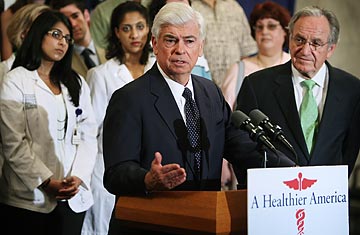
Senate Banking Committee chairman Christopher Dodd, center, talks about health-care reform as Senator Tom Harkin listens on June 16, 2009
(2 of 2)
While Democrats say they are hoping the extra time gives them an opportunity to forge a consensus that might even bring a Republican or two on board, they shouldn't count on it. One Republican alone, Oklahoma's Tom Coburn, is already letting it be known that he plans to offer more than 100 amendments. And though few of them will pass, they will put the brakes on the bill's progress.
Connecticut Senator Chris Dodd, the HELP Committee's second-ranking Democrat, has been trying to fill in for his good friend Kennedy. But he's had plenty else to occupy him. Dodd is also chairman of the Senate Banking Committee, which puts him on the front line for Congress's ongoing efforts to deal with the financial crisis, and he is facing what appears to be a difficult re-election bid next year in Connecticut. Only recently has he been able to give the health-reform bill a significant amount of his attention, colleagues say.
That has left Kennedy's aides pretty much on their own to write the bill. His is a top-notch staff, but they lack the chairman's touch for figuring out what his colleagues on both sides of the aisle are willing to back. An early version that leaked a couple of weeks ago was significantly more liberal than anything likely to actually pass the Senate. It included a strong public plan that would operate much like Medicare — inciting the opposition of both the private insurance industry, which says that kind of robust, federally-run program could drive it out of business, and doctors and hospitals, which are already chafing under the lower reimbursement they get from the government's senior citizens health-care program. The early version also would have provided subsidies to help people earning up to 500% of the poverty line purchase insurance, which is more generous and expensive than anything Congress is likely to approve. Both provisions would likely encounter strong resistance, not only from Republicans, but from more moderate Democrats as well.
So as the committee finally gets down to business, it finds itself with only an incomplete version of the bill. And even before it starts, it is already fending off political attacks. The Congressional Budget Office issued a preliminary estimate showing that, as it stands, the legislation would increase the deficit by $1 trillion over the next 10 years and still leave the number of uninsured about two-thirds as high as it is now. Republicans quickly jumped on the report about the half-baked bill to attack the whole endeavor. "The bottom line is this," said Senate minority leader Mitch McConnell. "Under the illusion of reform, Americans will be asked to give up the care they like for something worse, and then they'll be taxed to the hilt to pay for it."
